Digital Education Cyber Inclusion
Digital Education Cyber Inclusion
2022-1-IT01-KA210-VET-000081092
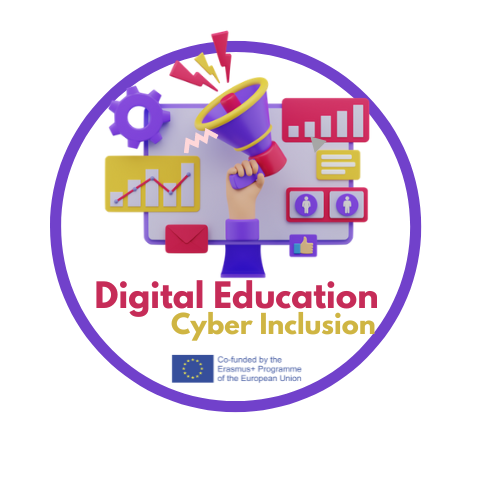
Funded by the European Union. Views and opinions expressed are however those of the author(s) only and do not necessarily reflect those of the European Union or the European Education and Culture Executive Agency (EACEA). Neither the European Union nor EACEA can be held responsible for them.
Programme: Erasmus+
Action Type: KA210-VET – Small-scale partnerships in vocational education and training
Start: 01/09/2022 – End: 01/03/2024
Project Reference: 2022-1-IT01-KA210-VET-000081092
EU Grant: 60.000 EUR
The project will be an Erasmus Plus KA210-VET – Small-scale partnerships according to Erasmus Plus Programme rules.
“Digital Education Cyber Inclusion” has the general purpose of equipping learners between 18 and 25 who aspire to work in organizations in defense of LGBTQIA+ rights, with digital skills to combat homo-transphobic cyberbullying, through the pursuit of objectives specific:
1.Improve the digital skills of trainers for the identification of homo-transphobic cyberbullying acts;
2. Develop methods of intervention against the phenomenon to be transferred to the learners.
The activities implemented will be:
1. Training course to improve the digital skills of trainers in identifying the phenomena of homo-transphobic cyberbullying;
2. Workshop for the creation of specific intervention guidelines against the phenomena identified to be transferred to the learners.
Thanks to the training course, there will be a 60% improvement in skills on the part of trainers and the creation of a community of permanent exchange between sector operators and 7 video-tutorials relating to digital identification tools. Through the second activity, the workshop, specific digital intervention guidelines will be developed and trainers will feel more ready by at least 50% than before, in transferring intervention guidelines to learners.
PARTNERSHIP
LEAD PARTNER: GAYCS

Gaycs è il dipartimento LGBTQIA+ di AICS – Associazione Italiana Cultura e Sport – ed è stato fondato nel 2012. Da luglio 2014 Gaycs promuove ogni anno il più grande evento sportivo LGBTQIA+ in Italia, l'”Italian Gaymes” (oltre 700 atleti provenienti da tutto il Paese che si sfidano in 10 discipline sportive).
Gaycs gestisce e promuove club sportivi LGBTQIA+ in tutta Italia in diverse grandi città, come Roma, Milano, Napoli, Genova e Bologna. Gaycs opera anche nei settori dell’advocacy, della salute sessuale, del supporto psicologico e legale, ed è specificamente impegnata nel campo dell’educazione ai diritti umani attraverso lo sport.
Dal 2013 la nostra associazione organizza Cocktail, la principale festa gayfriendly della domenica sera a Roma, finalizzata a sostenere attività di advocacy e sociali.
Nel 2016 Gaycs ha fondato la Nazionale italiana di calcio gay friendly, che gioca diverse partite senza scopo di lucro contro la Nazionale Italiana Attori e altre rappresentative impegnate in cause sociali di sensibilizzazione.
Ogni anno in primavera Gaycs organizza a Roma il torneo di calcio “Diamo un calcio all’omofobia” e da settembre 2017 promuove anche il Festival della letteratura LGBTQIA+ FLAG.
Da ottobre 2017, Gaycs sta portando avanti un piano sperimentale di educazione non formale attraverso lo sport, basato sul concetto di educazione ai diritti umani, che ora coinvolge oltre 50 persone tra i 18 e i 25 anni a Roma.
I nostri formatori stanno applicando il concetto di Compass – Manuale per l’educazione ai diritti umani con i giovani, curato per la seconda edizione nel 2015 dal Consiglio d’Europa – nell’ambito delle attività sportive.
Gli sforzi di Gaycs sono stati riconosciuti sia a livello nazionale che europeo. Nel 2016, la European Gay and Lesbian Sport Federation – EGLSF – ha affidato a Roma e a Gaycs l’organizzazione degli Eurogames 2019, il principale evento sportivo LGBTI in Europa.
Gaycs is the LGBTI department of AICS – Associazione Italiana Cultura e Sport – and has been founded in 2012. Every year since July 2014 Gaycs has been promoting the biggest LGBTI sport event in Italy, the “Italian Gaymes” (more than 700 athletes from all over the country competing in 10 sport disciplines).
Gaycs operates and promotes LGBTI sport clubs throughout Italy in several bigger cities, such as Rome, Milan, Naples, Genoa and Bologna. Gaycs also works in the fields of advocacy, sexual health, psychological and legal support, and is specifically involved in the field of human rights education through sport.
Since 2013 our association has been organizing Cocktail, the main gayfriendly Sunday night party in Rome, aimed at supporting advocacy and social activities.
In 2016 Gaycs founded the official Italian Gay friendly National Football Team, playing several not-for profit matches against the Italian Actors Football Team and other representatives involved in awareness raising social causes.
Each year during spring Gaycs organizes a football tournament called “Diamo un calcio all’omofobia” (Let’s Kick Homophobia) in Rome, and since September 2017 it also promoted the FLAG LGBTQIA+ Literature Festival.
Since October 2017, Gaycs has been carrying out an experimental plan of non formal education through sport, based on the concept of human rights education which now involves over 50 people aged between 18 and 25 in Rome.
Our trainers are applying the concept of Compass – Manual for Human Rights Education with Young People, edited for the second edition in 2015 by the Council of Europe – in the framework of sport activities.
The efforts of Gaycs have been acknowledged both at national and at European level. In 2016, the European Gay and Lesbian Sport Federation – EGLSF – assigned to Rome and Gaycs the organization of Eurogames 2019, the main LGBTQIA+ sport event in Europe.
SOS EUROPA

SOS EUROPA è una associazione indipendente di promozione sociale con sede a Roma, nata dall’entusiasmo dei suoi volontari per i valori europei avente come missione primaria il sostegno all’integrazione dei giovani dentro e fuori l’Unione Europea.
SOS Europa promuove e incoraggia da sempre lo scambio di culture, conoscenze ed esperienze: per questo motivo è molto attiva nel programma quadro Erasmus plus sia come ente applicante di progetti che come partner in scambi e progetti internazionali. Inoltre, da diversi anni diffonde le politiche europee nel settore gioventù grazie ai numerosi corsi che organizza frequentemente, cui partecipano esponenti di differenti realtà che lavorano a contatto con i giovani provenienti da tutto il territorio nazionale.
Il loro obbiettivo è promuovere la partecipazione alla vita democratica in Europa e al mercato del lavoro, la cittadinanza attiva, il dialogo interculturale, la solidarietà; favorire miglioramenti qualitativi nell’ambito dell’animazione socioeducativa; integrare le riforme politiche a livello locale, regionale e nazionale e sostenere lo sviluppo di una politica in materia di gioventù basata sulla conoscenza e su dati concreti; favorire il riconoscimento dell’apprendimento non formale e informale, in particolare mediante una cooperazione politica rafforzata; accrescere la dimensione internazionale delle attività nel settore della gioventù e il ruolo degli animatori socioeducativi (Youth Workers) e delle organizzazioni giovanili quali strutture di sostegno per i giovani.
SOS EUROPA is an independent association of social promotion based in Rome, born from the enthusiasm of its volunteers for European values with the primary mission of supporting the integration of young people inside and outside the European Union.
SOS Europa has always promoted and encouraged the exchange of cultures, knowledge and experiences: this is why it is very active in the Erasmus plus framework programme both as an implementing body for projects and as a partner in international exchanges and projects. Furthermore, for several years it has been disseminating European policies in the youth sector thanks to the numerous courses it frequently organises, which are attended by representatives of different realities working with young people from all over the country.
Their aim is to promote participation in democratic life in Europe and in the labour market, active citizenship, intercultural dialogue, solidarity; to promote qualitative improvements in youth work; to integrate policy reforms at local, regional and national level and to support the development of a knowledge-based and evidence-based youth policy; to promote the recognition of non-formal and informal learning, in particular through enhanced policy cooperation; to increase the international dimension of youth work and the role of youth workers and youth organisations as support structures for young people.
Association for Progress, Education and Lobbying – PEL
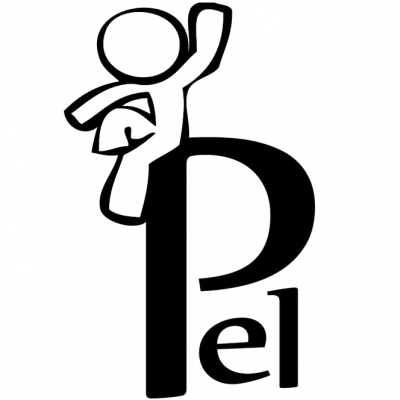
L’Associazione PEL è un’organizzazione non governativa senza scopo di lucro con l’obiettivo di migliorare la situazione dei giovani e delle donne in tutti i settori della vita sociale. Questo obiettivo viene raggiunto promuovendo i diritti umani, il volontariato e i loro valori e rendendo queste cose possibili a tutti i cittadini.
I membri del PEL appartengono a diversi gruppi etnici, religiosi o di genere che vivono in Macedonia a partire dai 16 anni.
I principali campi su cui lavorano sono: diritti umani, questioni di genere, sensibilizzazione della comunità, inclusione di gruppi emarginati e minoranze, migrazione, volontariato e sviluppo sostenibile. PEL collabora con lo SVE (Servizio Volontario Europeo) dal 2004 e ha ospitato e inviato molti volontari. Attualmente possono agire come organizzazione di invio, accoglienza e coordinamento (2017-1-MK01-KA110-03544).
Alcune delle attività che svolgono:
- Organizzazione di workshop, corsi di formazione, seminari, tavole rotonde, piattaforme sui valori che promuoviamo;
- Promozione dei nostri obiettivi e delle nostre attività attraverso i media e il pubblico;
- Organizzazione di campagne (locali, nazionali e internazionali),
- Coordinare lo scambio di volontari a livello locale, nazionale e internazionale;
- Cooperazione con altre organizzazioni locali e internazionali che promuovono i nostri valori.
Association PEL is non-profit, non-governmental organization with aim to improve the situation of young people and women in all areas of social life. This is achieved by promotion of human rights and voluntarism and their values and by making these things possible to all citizens.
Members of PEL belong to different ethnic, religious or gender groups that live in Macedonia on age from 16 years old.
Main fields on which they work on: human rights, gender issues, community awareness, inclusion of marginalised groups and minorities, migration, voluntarism and sustainable development. PEL has been working with EVS (European Voluntary Service) since 2004 and has hosted and sent many volunteers. They can currently act as sending, hosting and coordinating organisation (2017-1-MK01-KA110-03544).
Some of the activities they do:
– Organizing workshops, trainings, seminars, round tables, platforms about the values that we promote;
– Promotion of our aims and activities through media and public gathering;
– Organizing campaigns (local, national and international),
– Coordinating exchange of volunteers on local, national and international level;
– Cooperation with other local and international organizations that promote our values.
TRAINING COURSE A ROMA
Roma 4 maggio 2023
Giovedì 4 maggio si è tenuto a Roma il primo incontro in presenza del progetto Digital Education Cyber Inclusion. A questo meeting hanno preso parte quattro formatori (per ogni associazione) attivi nel campo dei diritti umani e delle persone LGBTQI. Le organizzazione coinvolte sono state PEL, SOS Europa e GAYCS.
l training course è stato finalizzato ad accrescere le competenze digitali per l’identificazione di atti di cyber bullismo omofobico e transfobico possedute dai formatori, che potranno introdurre i nuovi strumenti all’interno dei corsi di formazione ai discenti. L’attività è finalizzata al miglioramento delle competenze digitali per l’identificazione di atti di cyber bullismo contro persone LGBTQIA+ di formatori esperti in diritti umani e di persone LGBTQIA+. Infatti nel meeting si ha parlato e lavorato su diverse forme di cyber bullismo online e non solo. I partecipanti hanno individuato strumenti digitale di intercettazione efficace per le diverse forme di cyberbullismo, realizzando dei video-tutorial inerenti ai strumenti di intercettazione.
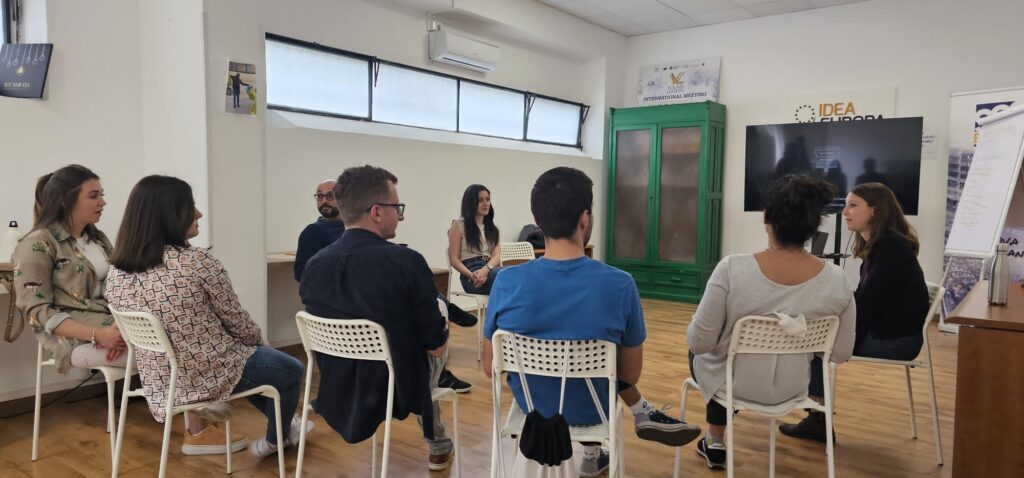
Ecco qua alcuni video fatti dai nostri partecipanti:
TRAINING COURSE IN ROME
Rome, 4th of May 2023
On Thursday 4 May, the first face-to-face meeting of the Digital Education Cyber Inclusion project was held in Rome. This meeting was attended by four trainers (from each association) active in the field of human rights and LGBTQIA+ people. The organisations involved were PEL, SOS Europa and GAYCS.
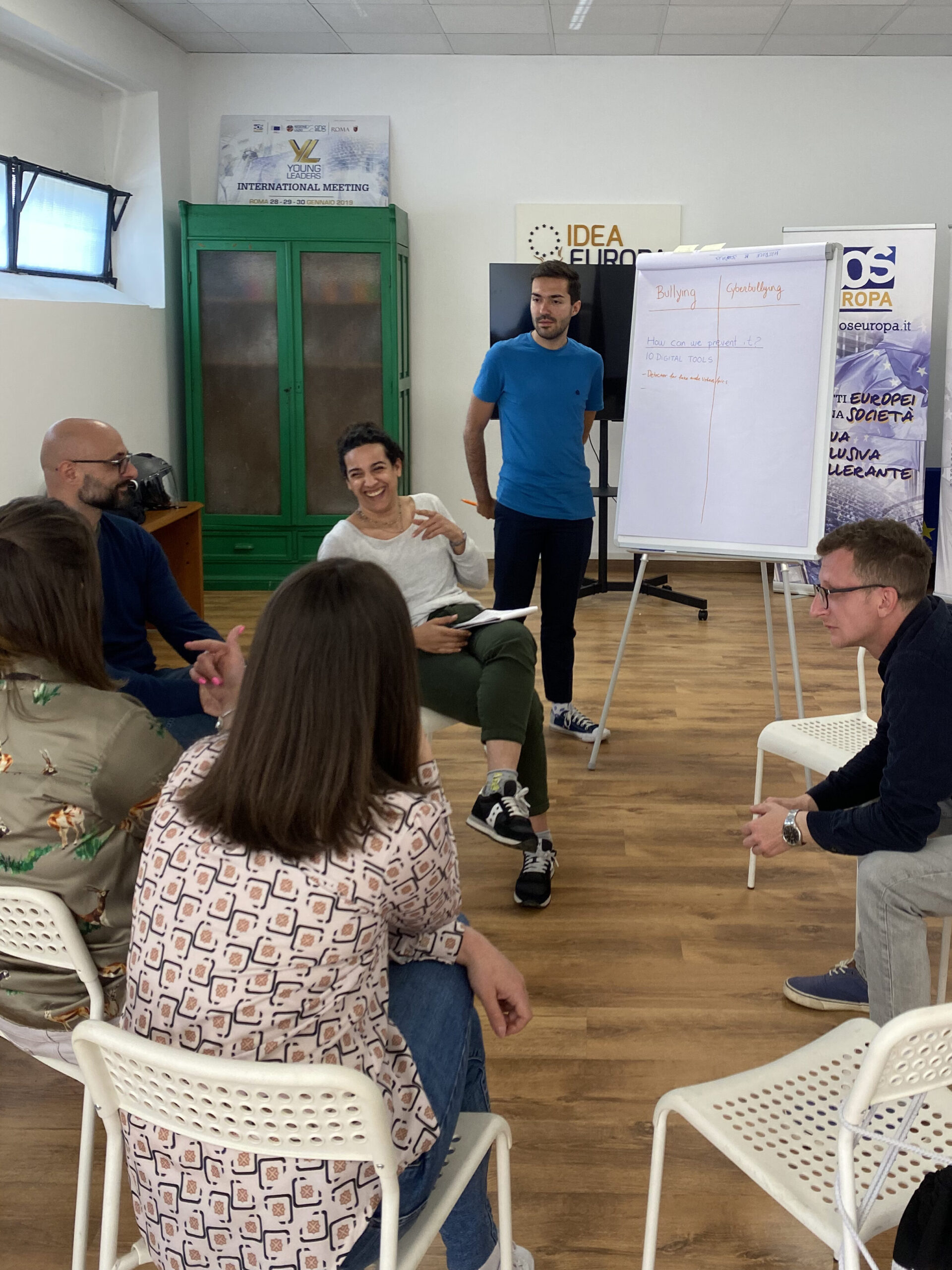
The training course was aimed at enhancing the digital skills for the identification of homophobic and transphobic acts of cyber bullying possessed by trainers, who will be able to introduce the new tools into their training courses for trainees. The activity is aimed at improving the digital competences for the identification of acts of cyber bullying against LGBTQIA+ people of trainers experienced in human rights and LGBTQIA+ people. In fact, the meeting discussed and worked on different forms of cyber bullying online and beyond. The participants identified effective digital interception tools for different forms of cyberbullying and made video tutorials on the interception tools.
Here you can find some video tutorials on how to identify different ways of cyberbullying:
CHECK THE GUIDELINES HERE IN PDF FORMAT:
Workshop a Skopje
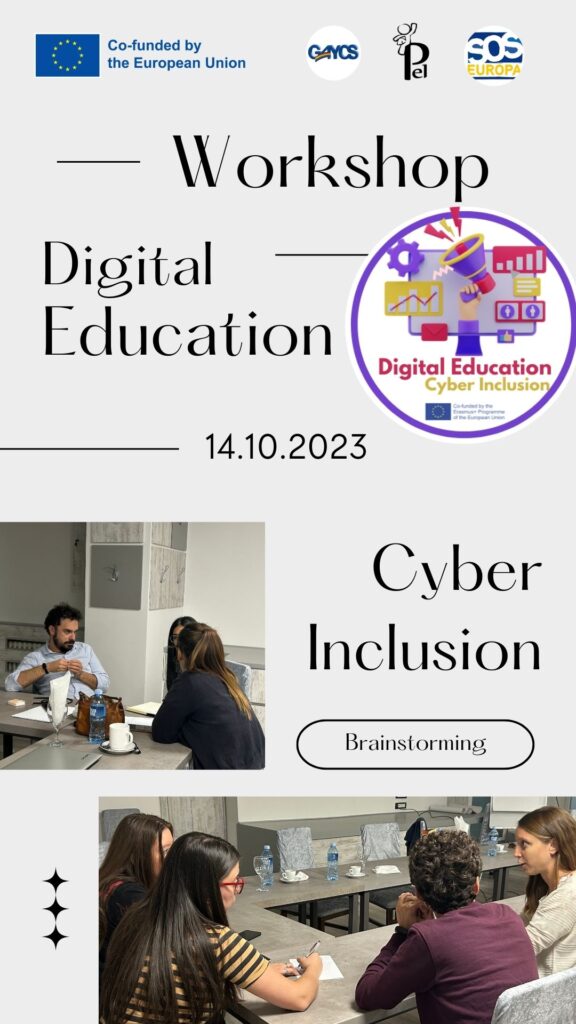
Sabato 14 ottobre il nostro caro partner PEL (Macedonia del Nord) ha ospitato il nostro secondo workshop, questa volta con l’obiettivo di preparare i formatori ad affrontare i temi del cyberbullismo, dell’omofobia e della transfobia. Il nostro obiettivo era quello di fornire ai formatori le strategie per intervenire e sostenere i giovani adulti tra i 18 e i 25 anni che si affacciano al mondo del lavoro.
Per iniziare il workshop nel migliore dei modi, abbiamo fatto un icebreaker. Subito dopo abbiamo iniziato a lavorare! Nei focus group i partecipanti hanno discusso i sistemi di intervento e formulato linee guida per affrontare sette diverse forme di cyberbullismo utilizzando un approccio tecnologico open space. Nella seconda parte della giornata, i partecipanti si sono riuniti in gruppi per esaminare a fondo e combinare le linee guida identificate. Queste linee guida sono state poi raccolte in un manuale in PDF, che ora serve come strumento per affrontare il cyberbullismo e le sfide ad esso associate.
GUIDELINES: WAYS OF CYBER BULLYING
Alla fine del workshop i partecipanti hanno fatto un test ed è stato evidente che i formatori hanno migliorato significativamente le loro competenze e siamo lieti di celebrarlo.
Analisi dei risultati ai tests
Tra l’altro, i partecipanti italiani al workshop ci hanno fornito preziosi feedback, e desideriamo condividerli con voi.
Feedback partecipanti italiani al workshop
Workshop in Skopje
On Saturday, October 14th our dear partner PEL (North Macedonia) hosted our second workshop, this time with the aim of preparing trainers to address the issues of cyberbullying, homophobia and transphobia. Our goal was to empower trainers with strategies to intervene and support young adults aged 18 to 25 who are entering professional fields.
GUIDELINES: INTERVENTION AND PREVENTION
In order to start the workshop in the best mood, we did an icebreaker. Right after that, we started to work! In focus groups the participants discussed intervention systems and formulated guidelines for addressing seven different forms of cyberbullying using an open space technology approach.On the second part of the day, participants came together in groups to thoroughly examine and combine the guidelines that had been identified. These guidelines were then gathered into a PDF manual, which serves now as a tool, for addressing cyberbullying and its associated challenges.
By the end of the workshop our participants took a test and it was evident that trainers had significantly improved their skills and we are delighted to celebrate it.
Analysis of the test results
CLOSING MEETING A ROMA
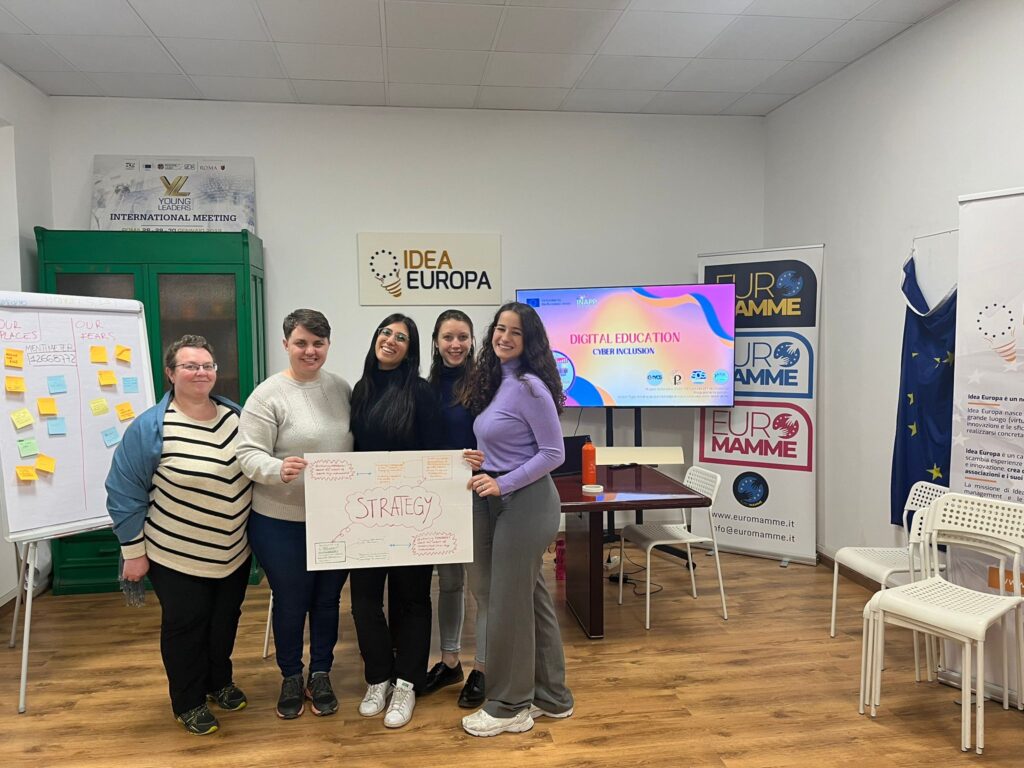
Il giorno 13 dicembre si è tenuto a Roma l’ultimo meeting del progetto Digital Eucation Cyber Inclusion, durante il quale hanno partecipato due referenti per ciascuna organizzazione, per un totale di 8 persone. Il meeting ha avuto lo scopo raggiungere iseguenti obiettivi:
-misurare gli impatti generati dai risultati del workshop in fase di follow-up,
-valutare il progetto nel suo complesso rispetto agli impatti di breve, medio e lungo termine di tutte le attività,
-valorizzare ulteriormente i punti di forza e la sostenibilità di lungo termine e gettare le basi per realizzare una versione 2.0 che verterà sugli adulti e sulla possibilità di trasferire strumenti di supporto ai figli vittime di bullismo;
-definire le linee guida per organizzare un open-day all’interno delle organizzazioni entro un mese dal closing meeting, così da garantire la diffusione del progetto attraverso eventi moltiplicatori.
Dopo aver presentato tutte le attività e i risultati del progetto, i project manager di ogni ente hanno espostoi risultati delle survey sottoposte al campione dei 20 discenti dai 18 ai 25 anni sul grado di miglioramento percepito nel contrasto al cyber bullismo omo-transfobico su una scala da 1 a 10. Il valore medio atteso è di 8.2, confermando così il raggiungimento dei risultati attesi. Dopo aver fissato i contenuti e la struttura generale, sulla base di questi dati è stato poi elaborato un report generale sugli impatti del progetto, nel quale sono stati indicati gli indicatori quali-quantitativi delle attività, responsabilità, risultati, raggiungimento obiettivi su singola unità. Tale deliverable, in lingua inglese,è consultabile e scaricabile gratuitamente dal sito di progetto.
La seconda parte del meeting è stata interamente dedicata all’analisi degli impatti, portando alla realizzazione di una strategia di disseminazione dei risultati e di sensibilizzazione delle comunità territoriali a lungo termine, delineando quindi le linee di azione per garantire la sostenibilità del progetto stesso. Tale strategia prevede la realizzazione di infoday mirati a target specifici: gli insegnanti delle scuole, gli studenti e le famiglie. L’obiettivo sarà quello di garantire la massima diffusione targettizzata dei risultati prodotti dal progetto e raccogliere i feedback necessari alla misurazione dell’impatto che essi avranno su alunni, dicenti e famigliari sul lungo periodo. Anche la strategia di disseminazione e sostenibilità è disponibile online in inglese sul sito di progetto.Per ottimizzare la pianificazione, è stato elaborato un calendario condiviso tra i partner di giornate nazionali, europee e internazionali dedicate al contrasto al bullismo e al cyberbullismo e alla sicurezza dei giovani sul web.
CLOSING MEETING IN ROME
On 13 December, the ‘ last meeting of the Digital Eucation Cyber Inclusion project, which was attended by two representatives from each organisation, for a total of 8 people. . The meeting was aimed at achieving the following objectives:
- measure the impacts generated by the workshop results in the follow-up phase ,
- evaluate the project as a whole with respect to the short-, medium- and long-term impacts of all activities,
- evaluate further the strengths strengths and long-term sustainability and lay the groundwork for a 2.0 version that will focus on adults and the possibility of transferring support tools to bullied children;
- define guidelines for organising an open-day within the organisations within one month after the closing meeting, in order to ensure the dissemination of the project through multiplier events.
After presenting all the activities and results of the project, the project managers from each institution presented the results of the surveys submitted to the sample of 20 learners aged 18 to 25 on the perceived degree of improvement in combating homo-transphobic cyber-bullying on a scale of 1 to 10. The average expected value is 8.2, thus confirming the achievement of the expected results. After establishing the content and general structure, a general report on the project’s impacts was then drawn up on the basis of this data, in which indicators were indicated such as -quantities of activities, responsibilities, results, achievement of objectives on individual units. This deliverable, in English, can be consulted and downloaded free of charge from the project website. The second part of the meeting was entirely dedicated to the analysis of impacts, leading to the realisation of a strategy for the dissemination of results and awareness-raising of long-term territorial communities, thus outlining lines of action to ensure the sustainability of the project itself. This strategy includes the implementation of infodays aimed at specific targets: school teachers, students and families.
The aim will be to ensure maximum targeted dissemination of the results produced by the project and to collect the feedback necessary to measure the impact they will have on pupils, teachers and families in the long term. The dissemination and sustainability strategy is also available online in English on the project website. In order to optimise the planning, a shared calendar of national, European and international days dedicated to combating bullying and cyberbullying and keeping young people safe on the web has been drawn up among the partners.
CALENDARIO CONDIVISO/ SHARED CALENDAR
Per promuovere gli eventi legati alla sicurezza informatica e a un Internet più sicuro, abbiamo creato un calendario condiviso in modo che tutti possano essere aggiornati e aggiungere il loro contributo.
In order to promote events related to cyber security and safer internet, we have created a shared calendar so that everyone can be updated and add their contribution.

RADIO RID – COMMUNICAZIONE DEL NOSTRO PROGETTO
Siamo entusiasti di condividere il successo del nostro lavoro con Radio RID e il progetto “Digital Education Cyber Inclusion”, finanziato dalla Commissione Europea.
Il 29 marzo, i team di GAYCS e SOS EUROPA hanno parlato dei risultati del progetto e degli obiettivi futuri a Radio RID a Roma. È stato un momento importante per la nostra missione di promuovere l’educazione digitale e l’inclusione informatica. Radio RID ci ha aiutato a raggiungere un maggior numero di persone e a discutere perché l’alfabetizzazione e l’accesso al digitale sono importanti per tutti.
La collaborazione con Radio RID è stata un grande successo. Abbiamo amplificato il nostro importante messaggio a più persone e abbiamo aumentato la consapevolezza che l’alfabetizzazione e l’accesso al digitale sono importanti per ogni comunità.
Il nostro sincero apprezzamento va a Radio RID. Sono stati al nostro fianco, fornendo assistenza e dedizione essenziali. Uniti, progrediamo verso una società in cui l’inclusione digitale è realtà. Tutti hanno la possibilità di prosperare nell’era digitale.
Continuate a seguirci per ulteriori notizie. Condivideremo il nostro percorso di educazione digitale e di inclusione.
RADIO RID – COMMUNICATION OF THE PROJECT
We are excited to share our successful work with Radio RID and the “Digital Education Cyber Inclusion” project, funded by the European Commission.

On March 29th, teams from GAYCS and SOS EUROPA talked about the project’s results and future goals on Radio RID in Rome. This was a big moment for our mission to promote digital education and cyber inclusion. Radio RID helped us reach more people and discuss why digital literacy and access are important for everyone.
Working with Radio RID was a huge success. We amplified our important message to more people. We started meaningful talks raising awareness that digital literacy and access matter for every community.
Our sincere appreciation goes out to Radio RID. They have stood by us, providing essential assistance and dedication. United, we progress toward a society where digital inclusion is reality. Everyone gets a fair chance to flourish in the digital era.
We’ll share our ongoing digital education and cyber inclusion journey.